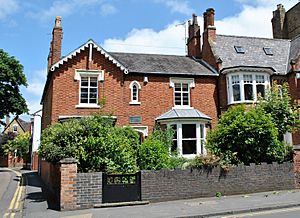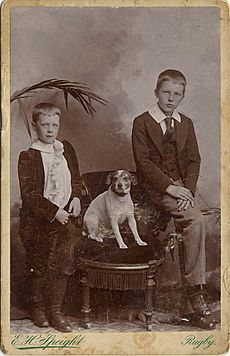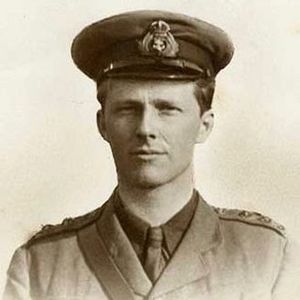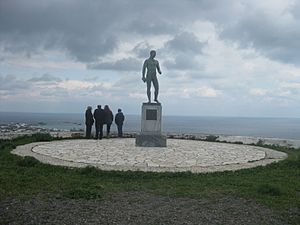Rupert Brooke facts for kids
Quick facts for kids
Rupert Brooke
|
|
|---|---|
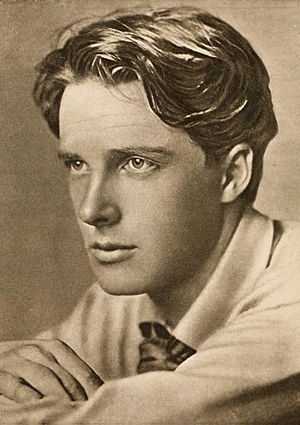
Brooke c. 1910s
|
|
| Born |
Rupert Chawner Brooke
3 August 1887 Rugby, Warwickshire, England
|
| Died | 23 April 1915 (aged 27) Skyros, Greece
|
| Education |
|
| Occupation | Poet |
| Employer | Sidgwick & Jackson (publisher) |
| Signature | |
Rupert Chawner Brooke (born August 3, 1887 – died April 23, 1915) was an English poet. He became famous for his poems about war, especially "The Soldier". He wrote these poems during the First World War. Many people also knew him for his good looks. The Irish poet W. B. Yeats once called him "the handsomest young man in England."
Contents
Early Life and Education
Rupert Brooke was born in Rugby, Warwickshire, England. He was the third of four children. His father, William Parker Brooke, was a teacher. His mother, Ruth Mary Brooke, was a school matron.
Rupert went to a local prep school called Hillbrow. After that, he attended Rugby School, where his father worked. At Rugby, he made many friends. In 1905, he became friends with St. John Lucas, who became a guide for him.
In 1906, Rupert went to King's College, Cambridge to study classics. While at Cambridge, he joined a famous group called the Cambridge Apostles. He also helped start a drama club called the Marlowe Society. He even acted in some plays. Many people he met at school and university became lifelong friends. His older brother, Dick, passed away in 1907. Rupert wanted to pause his studies to help his parents, but they encouraged him to return to university.
There is a special blue plaque at a place called The Orchard. It says that Rupert Brooke, a poet and soldier, lived and wrote there from 1909 to 1911. He also lived at The Old Vicarage from 1911 to 1912.
Becoming a Poet
Brooke became friends with writers from the Bloomsbury group. Some admired his writing, while others were more impressed by his looks. He was also part of another group of writers called the Georgian poets. He was an important member of the Dymock poets. This group met in the village of Dymock in Gloucestershire. Famous poets like Robert Frost and Edward Thomas were also in this group.
Rupert Brooke lived at the Old Vicarage in Grantchester. This place inspired one of his most famous poems, which is named after the house. He wrote it in 1912 while feeling homesick in Berlin. He traveled around Europe and wrote a paper about old English plays. This paper helped him become a fellow at King's College, Cambridge, in 1913.
In 1912, Brooke went through a difficult time. To help him recover, he traveled to the United States and Canada. He wrote travel stories for a newspaper called the Westminster Gazette. He then sailed across the Pacific Ocean and spent several months in the South Seas.
When World War I began in August 1914, Brooke joined the army. He quickly became known as a war poet. In March 1915, a newspaper published two of his sonnets, "IV: The Dead" and "V: The Soldier." "The Soldier" was even read in St Paul's Cathedral on Easter Sunday. His most famous poetry book, 1914 & Other Poems, came out in May 1915. It was very popular and was printed many times that year.
Many people loved Brooke's poetry. He was introduced to Winston Churchill, who was an important leader at the time. Brooke joined the Royal Naval Volunteer Reserve as an officer. He took part in a military operation in Antwerp in October 1914.
His Final Days
Rupert Brooke sailed with the British forces in February 1915. While in Egypt, he became very ill with a stomach infection. Then, he got a serious infection from a mosquito bite. Doctors tried to help him, but he died on April 23, 1915. He was on a French hospital ship near the Greek island of Skyros. He was on his way to the Gallipoli campaign.
Because the army had to leave quickly, Brooke was buried that night in an olive grove on Skyros. Another poet and friend, Patrick Shaw-Stewart, helped with his burial. His grave is still there today. A monument was later built by his friend Stanley Casson.
Rupert's younger brother, William Alfred Cotterill Brooke, also died in the war. He was killed in France in June 1915, at the age of 24.
In 1917, a military leader named Field Marshal Edmund Allenby heard that his son had died in battle. Allenby was very sad and cried in public while reciting a poem by Rupert Brooke.
Remembering Rupert Brooke
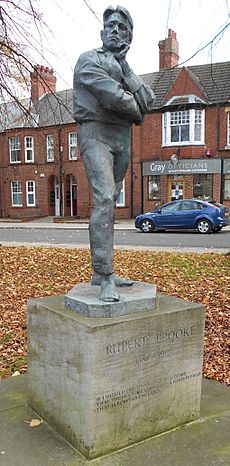
On November 11, 1985, Rupert Brooke was honored in Poets' Corner in Westminster Abbey. A stone monument was put there for 16 poets from the First World War. The words on the stone were written by another war poet, Wilfred Owen. They say: "My subject is War, and the pity of War. The Poetry is in the pity."
The first wooden cross that marked Brooke's grave on Skyros was brought to Rugby. It was placed in his family's burial plot. Because it was outside, it started to wear away. In 2008, it was moved to Rugby School where other memorials are kept. A new, more lasting marker was put at his grave.
The first part of Brooke's poem "The Dead" is written on the base of the Royal Naval Division War Memorial in London.
In Wellington, New Zealand, the Cenotaph has words from "The Dead" carved on it. These words honor those who gave their lives in war.
In 1988, a statue of Rupert Brooke was placed in his hometown of Rugby, Warwickshire. The sculptor was Ivor Roberts-Jones.
An American adventurer named Richard Halliburton planned to write a book about Brooke. He met Brooke's mother and collected many notes. However, he passed away before he could write the book. His notes were later used by Arthur Springer to write a book called Red Wine of Youth: A Biography of Rupert Brooke.
Images for kids
-
A detail from the Memorial Arch at the Royal Military College of Canada, inspired by Brooke's poem "Blow Out, You Bugles."
See also
 In Spanish: Rupert Brooke para niños
In Spanish: Rupert Brooke para niños
- List of Bloomsbury Group people


